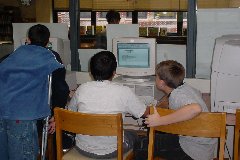Information Literacy
Standard 1: The student who is information literate accesses information efficiently and effectively.
Standard 2: The student who is information literate evaluates information critically and competently.
Standard 3: The student who is information literate uses information accurately and creatively.
Independent Learning
Standard 4: The student who is an independent learner is information literate and pursues information related to personal interests.
Standard 5: The student who is an independent learner is information literate and appreciates literature and other creative expressions of information.
Standard 6: The student who is an independent learner is information literate and strives for excellence in information seeking and knowledge generation.
Social Responsibility
Standard 7: The student who contributes positively to the learning community and to society is information literate and recognizes the importance of information to a democratic society.
Standard 8: The student who contributes positively to the learning community and to society is information literate and practices ethical behavior in regard to information and information technology.
Standard 9: The student who contributes positively to the learning community and to society is information literate and participates effectively in groups to pursue and generate information.
Performance Indicators:
Students will:
1-Media Center Responsibilities
a. Understand what a library is.
b. demonstrate good citizenship in the library by following rules and procedures.
c. utilize the librarian as a teacher and resource person.
d. Demonstrate proper care of a book and other materials in the library.
e. Follow circulation procedures.
2- Collection Organization/Location
a. display the ability to locate easy fiction, non-fiction, easy-to-read books and other relevant materials.
b. Understand the arrangement of fiction and non-fiction books including numerical vs. alphabetical order and arrangement of non-fiction by subject.
c. Select materials for themselves.
d. Understand that each item has a specific place on the library shelves.
e. Have the knowledge to search the catalog (OPAC) by subject, author, title and for availability.
f. Develop an understanding of catalog records.
g. Develop searching strategies (electronic and manual).
h. Develop an understanding of the Dewey Decimal System.
3- Literature Appreciation
a. Recognize the variety of books available in the library.
b. Have an understanding of the Caldecott and Newbery Medal.
c. Have the ability to identify a variety of authors and genres (storytelling, tall tales, folktales, fairy tales, myths, legends, poetry, biography, autobiography, fiction genres: historical, fantasy, science, realistic, mystery).
d. Develop an understanding of story elements (visual literacy, predicting, sequencing, character, setting, and plot).
e. Develop an appreciation for his/her favorite books and authors.
f. Recognize that books are for enjoyment as well as for information.
4- Listening and Interactive Skills
a. recognize that quiet listening is necessary for group attention and enjoyment.
b. respond appropriately to what is seen and heard.
c. ability to differentiate between factual and non-factual information
d. comprehend and restate factual information
5- Reference Skills
a. Understand alphabetical and numerical order.
b. Develop an understanding of keyword searching.
c. Understand that several search terms are needed for complete research.
d. Begin to develop an understanding of how to use encyclopedias, atlas, dictionary, indexing, almanac and thesaurus, electronic databases and specialized encyclopedias.
e. Participate in collaborated classroom/library supported research projects.
f. Begin to understand the process of choosing an appropriate resource .
g. Begin to understand how to evaluate resources using reliability, currency and accuracy.
6- Vocabulary
a. use and understand the following terms:
- borrow, return, renew, overdue, plagiarism
- author, title, illustrator
- spine, spine label, cover, barcode, paperback, hardcover, pages, publisher, copyright date.
7- Subject headings, see and see also, database, fieldStudy Skills
a. understand the organization of a book (table of contents, index)
b. develop (in collaboration with classroom teaching) an understanding of
note-taking, outlining, skimming, and organizing.
c. gain knowledge about the format of bibliographies.
| Assessment: | Acceptable Performance Level |
| Conversations, questions, observations | Students will respond and participate in activities to support performance indicators. |
| Circulation statistics | All students will participate in book exchange. Circulation statistics will increase each year. |
| Surveys of knowledge and interests | 90% of students will answer questions on survey correctly. |
| Small group questioning | Students will actively participate in group discussions. |
| Report card grading | 90% of students will receive a 3 or 4 in all categories. |
| Concept | Supporting Activities | Performance Indicator | Achieved Peformance Level | |
| SEPT/
ONGOING |
Media Center Responsibilities-
Proper handling of library materials |
Ongoing-
Book exchange Questionnaire survey |
1 | Master |
| OCT/
ONGOING |
Collection organization-
OPAC |
OPAC presentation on monitor-
Students look up books on Ancient Egypt in the OPAC and answer questions on a worksheet about the records. |
2 | Master |
| ONGOING | Literature appreciation-Variety of Genres | Book displays,
Booktalks, Book reports assigned by classroom teacher, Questionnaire Poetry (APR) |
3 | Reinforced | |
| ONGOING | Author and illustrator appreciation | Author visit,
Questionnaire, Booktalks; displays |
3 | Reinforced |


| Name of Student | author | title | illustrator | spine | spine label | publisher | barcode | copyright | ||